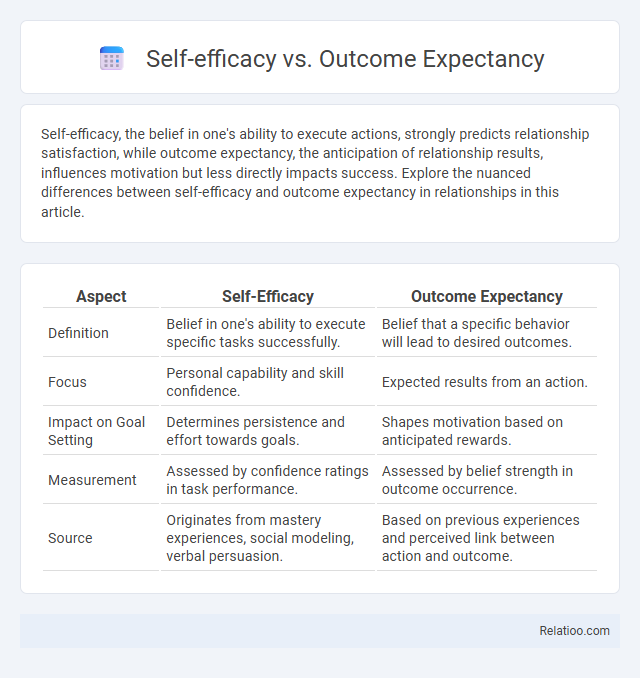Self-efficacy, the belief in one's ability to execute actions, strongly predicts relationship satisfaction, while outcome expectancy, the anticipation of relationship results, influences motivation but less directly impacts success. Explore the nuanced differences between self-efficacy and outcome expectancy in relationships in this article.
Table of Comparison
| Aspect | Self-Efficacy | Outcome Expectancy |
|---|---|---|
| Definition | Belief in one's ability to execute specific tasks successfully. | Belief that a specific behavior will lead to desired outcomes. |
| Focus | Personal capability and skill confidence. | Expected results from an action. |
| Impact on Goal Setting | Determines persistence and effort towards goals. | Shapes motivation based on anticipated rewards. |
| Measurement | Assessed by confidence ratings in task performance. | Assessed by belief strength in outcome occurrence. |
| Source | Originates from mastery experiences, social modeling, verbal persuasion. | Based on previous experiences and perceived link between action and outcome. |
Understanding Self-Efficacy: Definition and Core Concepts
Self-efficacy refers to your belief in your ability to execute specific tasks successfully, which directly influences motivation and persistence. Outcome expectancy involves anticipating the results of actions, while self-efficacy centers on confidence in personal capabilities regardless of expected outcomes. Understanding self-efficacy is crucial for enhancing goal-setting, resilience, and performance across various domains.
What is Outcome Expectancy? Key Principles Explained
Outcome expectancy refers to your belief about the consequences or results that will follow from a specific behavior or action. It is a key psychological concept predicting motivation and effort by linking actions to expected outcomes, distinct from self-efficacy, which focuses on your confidence in performing the behavior itself. Understanding outcome expectancy helps in assessing how your expectations influence decision-making and goal achievement.
Origin and Theoretical Background of Self-Efficacy
Self-efficacy, first conceptualized by psychologist Albert Bandura in 1977, originates from social cognitive theory and focuses on an individual's belief in their ability to execute specific actions to achieve desired results. Unlike outcome expectancy, which predicts the likelihood of certain consequences following an action, self-efficacy centers on your confidence in performing the task itself. This theoretical foundation emphasizes that higher self-efficacy enhances motivation and persistence, directly influencing behavioral change and goal attainment.
The Science Behind Outcome Expectancy
Outcome expectancy refers to your belief about the likelihood that a specific behavior will lead to a desired outcome, playing a critical role in motivation and decision-making processes. The science behind outcome expectancy highlights how cognitive evaluations of potential results influence goal-directed behavior and learning by shaping expectations of success or failure. Distinguished from self-efficacy, which centers on your confidence in performing a behavior, outcome expectancy focuses on anticipated consequences, both concepts interacting to drive behavior change effectively.
Self-Efficacy vs Outcome Expectancy: Key Differences
Self-efficacy refers to an individual's belief in their capability to execute specific tasks successfully, influencing motivation and perseverance. Outcome expectancy, by contrast, involves the anticipated results or consequences of performing a behavior, shaping decision-making based on expected rewards or punishments. Distinguishing these concepts is crucial for psychological interventions, as boosting self-efficacy enhances task performance, whereas modifying outcome expectancy affects behavior choice through altering perceived benefits or risks.
How Self-Efficacy Influences Behavior and Motivation
Self-efficacy, your belief in your ability to succeed in specific tasks, directly impacts behavior and motivation by shaping the effort and persistence you apply toward goals. Unlike outcome expectancy, which involves the anticipated consequences of actions, self-efficacy determines how confidently you engage in activities despite challenges. Strong self-efficacy increases resilience and adaptive coping strategies, making it a critical driver for sustained motivation and behavioral change.
The Role of Outcome Expectancy in Decision Making
Outcome expectancy plays a critical role in decision making by influencing the anticipated consequences of actions, shaping motivation and goal-setting behaviors. Unlike self-efficacy, which focuses on one's belief in their ability to perform specific tasks, outcome expectancy refers to the belief that certain behaviors will lead to desired results. Understanding the distinction between self-efficacy and outcome expectancy enhances psychological models of behavior change and improves strategies for promoting effective decision-making processes.
Interplay Between Self-Efficacy and Outcome Expectancy
The interplay between self-efficacy and outcome expectancy crucially influences motivation and behavior change, where self-efficacy represents Your belief in your capability to execute actions, and outcome expectancy involves the anticipated results of those actions. High self-efficacy enhances the likelihood of engaging in behaviors due to confidence in skill mastery, while positive outcome expectancy strengthens the perceived value of behaviors, leading to sustained effort and persistence. Understanding this dynamic helps optimize behavioral interventions by targeting both Your confidence in performing tasks and the expected benefits, maximizing goal attainment.
Enhancing Self-Efficacy and Optimizing Outcome Expectancy
Enhancing self-efficacy involves building confidence in one's ability to perform specific tasks through mastery experiences, social modeling, and verbal persuasion, which directly improves motivation and persistence. Optimizing outcome expectancy requires clarifying the positive consequences of actions and aligning them with personal goals, thereby strengthening the perceived value of effort. Together, fostering strong self-efficacy and realistic, positive outcome expectancy maximizes behavioral change and goal achievement.
Practical Applications: From Theory to Real-World Impact
Understanding the distinctions between self-efficacy, outcome expectancy, and self-confidence is crucial for applying psychological theories effectively in real-world settings. Self-efficacy reflects your belief in your ability to perform specific tasks, directly influencing motivation and perseverance, while outcome expectancy involves anticipating the results of your actions, shaping decision-making processes. Leveraging these concepts can enhance interventions in education, health, and workplace environments by fostering goal-setting, resilience, and behavior change tailored to individual beliefs and expectations.

Infographic: Self-efficacy vs Outcome Expectancy
 relatioo.com
relatioo.com